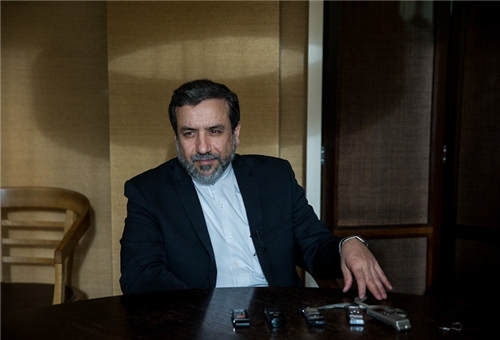Deputy FM: Iran, G5+1 Moving towards Removal of Differences

 Iranian Deputy Foreign Minister Seyed Abbas Araqchi said there are still complex differences between Tehran and the Group 5+1 (the five permanent UN Security Council members plus Germany), but both sides are trying to remove the obstacles.
Iranian Deputy Foreign Minister Seyed Abbas Araqchi said there are still complex differences between Tehran and the Group 5+1 (the five permanent UN Security Council members plus Germany), but both sides are trying to remove the obstacles.
“Our differences are still too many, but we are now moving on a path to remove them,” said Araqchi, who is a senior member and spokesman of Iran’s negotiating team in the nuclear talks with the world powers.
He reiterated that the G5+1 countries have accepted the outlines of Iran’s proposals for removing the differences.
“And now we should wait for their practical measures,” he added.
Iran and the six world powers agreed in their third session of talks on Wednesday afternoon to follow up on the nuclear negotiations on November 7 and 8.
Some other reports spoke of the acceptance of the Additional Protocol to the nuclear Non-Proliferation Treaty (NPT) by Iran, which includes snap inspections of Iran’s nuclear facilities. Endorsement of the Additional Protocol needs the approval by not just the Iranian government, but the parliament.
And in response, senior Iranian parliamentary officials underlined that accepting the Additional Protocol should take place after the world powers recognize all the nuclear rights of the Iranian nation.
“Accepting the Additional Protocol depends on the recognition of all the nuclear rights of the Iranian nation, including (uranium) enrichment” by the world powers, the Presiding Board member of the parliament’s National Security and Foreign Policy Commission, Mohammad Hassan Asafari, told FNA on Wednesday.
He reiterated that Iran has transparent criteria in its talks with the western powers which include protection of the inalienable right of the Iranian nation to use the nuclear energy and uranium enrichment.
“Acceptance of the Additional Protocol needs the parliament’s approval and if the talks take place within this framework and the Iranian nation’s rights are respected, this can be studied,” Asafari said.
Also, another ranking member of the Iranian legislator, Hassan Kamran, said the legislature is going to study the Additional Protocol to the NPT on Sunday, reiterating that any acceptance of the protocol needs the parliament’s approval.
“This issue (Additional Protocol) needs the parliament’s approval and we will discuss it in the Sunday session of the National Security and Foreign Policy Commission,” member of the parliament’s National Security and Foreign Policy Commission Hassan Kamran said Wednesday.
“All the people who represent Iran in the negotiations should consider the country’s national interests,” he added.
Yesterday, Asafari announced that the parliament’s National Security and Foreign Policy Commission would review the outcome of the talks between Iran and the six world powers in its upcoming session on Sunday.
“In this session the subjects and topics discussed in the negotiations will go under precise study,” Asafari told FNA, and added, “Supervision over the performance of the country’s diplomatic apparatus is a duty of the parliament and its National Security and Foreign Policy Commission.”
The additional protocol was created following the discovery of clandestine nuclear weapons programs in Iraq and North Korea during the 1990s. Countries conclude specific additional protocols to supplement their IAEA safeguards arrangement.
For the Additional Protocol to be enforced in any country, it needs the approval of both the government and the parliament of that country.
In addition to those which have basically rejected endorsement of the NPT, most signatories to the NPT have also defied accepting the agreement. Accepting the protocol is a voluntary, and not compulsory, decision.







